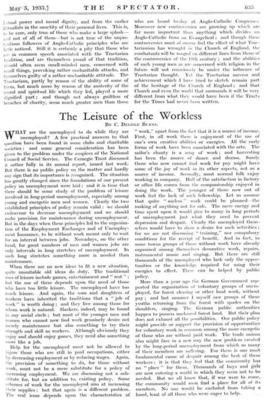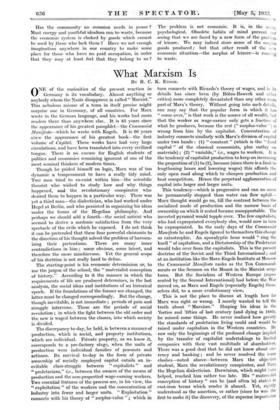The Leisure of the Workless BY C. BELISLE BURNS.
WHAT are the unemployed to do while they are unemployed? A few practical answers to that question have been found in some clubs and charitable societies : and some general consideration has been given to the problem under the auspices of the National Council of Social Service. The Carnegie Trust discussed it rather fully in its annual report, issued last week. But there is no public policy on the matter and hardly any sign that-its importance is recognized. The situation has greatly changed since the foundations of our present policy on unemployment were laid ; and it is time that there should be some study of the problem of leisure involved in long-period unemployment, especially among young and energetic men and women. Clearly the two established principles of policy remain valid : we should endeavour to decrease unemployment and we should make provision for maintenance during unemployment. But in the days when these principles led to the organiza- tion of the Employment Exchanges and of Unemploy- ment Insurance, to be without work meant only to wait for an interval between jobs. Nowadays, on the other hand, for great numbers of men and women jobs are only intervals in long stretches of unemployment. In such long stretches something more is needed than maintenance.
When there are no new ideas to fit a new situation, quite unsuitable old ideas do duty. The traditional uses of leisure include games, entertainment and " rest " ; but the use of these depends upon the need of those who have too little leisure. The unemployed have too much leisure. And again, the -sons . and daughters of workers have inherited the traditions that a " job of work " is worth doing ; and they live among those for whom work is natural. Slackers, indeed, may be found in any social circle ; but most of the younger men and women who cannot now find work genuinely desire not merely maintenance but also something to try their strength and skill as workers. Although obviously they enjoy and should enjoy games, they need also something more like a job.
Help for the unemployed must not be allowed to injure those who are- still in paid occupations, either by decreasing employment or by reducing wages. Again, the provision of something to do, for those without work, must not be a mere substitute for a policy of increasing employment. We are discussing not a sub- stitute for, but an addition to, existing policy. Some schemes of work for the 'unemployed aim- at increasing their supplies : but -that again is a • different problem. The real -issue . depends upon the -characteristics of " work," apart from the fact that it is a source of income. First, in all work there is enjoyment of the use of one's own creative abilities or energies. All the early forms of work have been associated with the arts. The sailor's chanty is a song of work ; and harvesting has been the source of dance and drama. Surely those who now cannot find work for pay might have some of the joy of work in its other aspects, not as a source of income. Secondly, most normal folk enjoy working in company. Half of the satisfaction in factory or office life comes from the companionship enjoyed in doing the work. The younger of those now out of work feel the lack of such fellowship. Let us assume that quite " useless " work could be planned—the making of anything not for sale. The mere energy and time spent upon it would give to many in long periods of unemployment just what they need to prevent depression and despair. Clearly the unemployed them- selves would have to show a desire for such activities ; for we are not discussing " training," nor compulsory conditions for the receipt of benefit. And in fact, in some towns groups of those without work have already organized among themselves decorative work, repairs, instrumental music and singing. But there are still thousands of the unemployed who lack only the oppor- tunities or the knowledge required for using their energies to effect. These can be helped by public policy.
More than a year ago the German Government sup- ported the organization of voluntary groups of unem- ployed, for forest clearing or other land work, without pay ; and last summer I myself saw groups of these youths returning from the forest with spades on the shoulders, singing. The German public authorities happen to possess uncleared forest land. But their plan does not exhaust all the possibilities. Our public policy might provide or support the provision of opportunities for voluntary work in common among the more energetic of those who are without paid work. The trade unions also might face in a new way the new. problem created by the long-period unemployment from which so many of their members are suffering. For there is one most fundamental cause of despair among the best of these workers : it- is that they feel that the community has no " place " for -them. Thousands of boys and girls are now entering a world in. which they seem not to be needed. But we all know that, if war were to come, the community would soon find a place for all of its members. No one would be excluded from taking a hand, least of all those who were eager to help. Has the 'community no •common needs in peace Must energy and youthful-idealism run to-waste, because the economic system is choked by goods which cannot be used by those who lack them ? Have we not• enough -imagination anywhere in our country to make some place for those who have no paid occupation, in order that they may at least feel that they belong to us ? The problem is not economic. It is,- in the n,a psychological. Obsolete habits of mind prevent our seeing that we are faced by a new form of the problem of leisure. We may indeed store some of the surplus goods produced ; but that other result of the new economic situation—the surplus of leisure—is running to waste.











































 Previous page
Previous page